|
 Fast food -good or bad? Fast food -good or bad?
Winner:
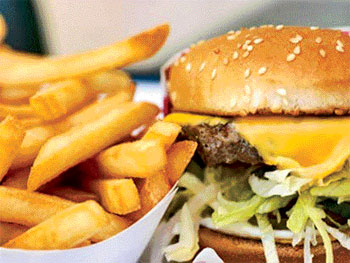
In most countries including Sri Lanka, people eat fast food on a
regular basis because it is convenient. They think of only how it helps
with their fast- paced lifestyles and not the effects it has on their
health.There are many disadvantages of eating fast food, especially
health problems such as becoming obese and suffering from heart
ailments. Fast foods are high in cholesterol;they contain a lot of fat
and sugars. Food like potato fries, hamburgers and ice cream shakes are
rich in unhealthy fat and high in calories.
Many people, especially children think that fast foods are tastier
than home cooked food and enjoy eating out. Some fast foods contain many
unhealthy additives and flavours to enhance taste so it is not healthy
to eat them very often. Eating them often could lead to many health
hazards. Even though some fast foods may be low in cost they may not be
high in quality. We should balance our intake of fast foods by eating
plenty of fresh fruits and vegetables. We must try to eat nutritious
food everyday without eating only fast foods. We must make healthy
choices when it comes to our diet. For example, we must opt to eat
boiled vegetables instead of fried ones or drink milk instead of sugar
based and fizzy beverages.
If fast food is not healthy why have them, some may ask. It is not
necessary to stop eating fast food or close down such outlets if one
knows how to limit the amount one eats.
Madhushani Palliyaguru,
Grade 7 A,
Willesden International,
I am an active horse
Winner:
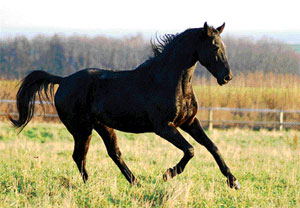
I am a horse. My name is Sunny. My colour is black. I am very tall
and also young,strong and healthy. I can beat anybody who comes to race
with me. I am very proud of myself.
I always want to run ,jump and play with my friends. My owner wants
me to be healthy and win all the races I take part in .He likes me
because he enjoys being famous. I bring happiness to a lot of people. I
may even be featured in the newspapers someday with a photograph of
myself along with the trophies I have won.They may call me, "Sunny, the
black stallion".
At present everything is fine. My life is full of freedom .But sad
times will start only when I am old and unable to win any races. This
will be the time nobody wants me or cares about me. I am sad to say that
when I am old and feeble, they will shoot me down. I will probably end
up on the dinner plate of some animals in the zoo.But dear friends,
"forget me not".
Roshan Ranasinghe,
Grade 4,
Negombo South International School, Nittambuwa.
Busy bees
Winner:
 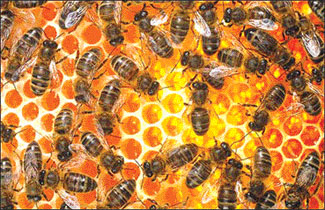 Bees are flying insects. Their colours are black and yellow. They
have six legs, four wings, two feelers and a sting. Bees live in
colonies or groups. They live in a beehive. Bees are flying insects. Their colours are black and yellow. They
have six legs, four wings, two feelers and a sting. Bees live in
colonies or groups. They live in a beehive.
There is a queen bee in their kingdom. She lays eggs. She is the head
of their colony. In their colony there are drones, workers and soldiers.
They are very active. Soldier bees are always flying around their
beehive for security purposes. Some workers fly for over two to three
miles to collect nectar.
They store nectar in the cages of their beehive. Some worker bees
feed nectar to their larva and store the excess. They make their beehive
using wax.
They take nectar from flowers and fruits. Drones protect the queen
bee. Bees are useful to people also. I like busy bees very much.
Hasali Edirisinghe,
Grade 6B,
Musaeus College, Colombo 7.
Water management is important to conserve resources
Winner:
Sri Lanka is fortunate that she does not have to share her water
resources with any other country. Many countries that have to share
their water resources with bordering countries face disputes over it.
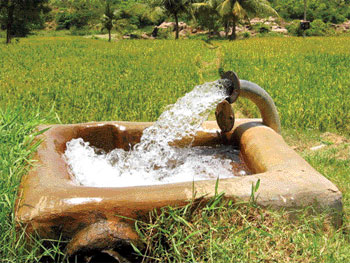 We have to be thankful for the many natural waterways we have in the
form of rivers and lakes, and learn to manage these resources. We have to be thankful for the many natural waterways we have in the
form of rivers and lakes, and learn to manage these resources.
If we do not protect and preserve our natural environment these
valuable water bodies could run dry. So far Sri Lanka has been able to
minimise environmental hazards and manage her water resources well.
There are two aspects of water management. One is to ensure there is
sufficient water to meet the needs of the environment and the other is
to allocate adequate water to meet the human needs of water; for
domestic,agricultural and industrial requirements such as power
generation.
The excessive removal of water from rivers,reservoirs and other water
bodies for irrigation purposes has exposed many plant,bird and animal
species to danger.
Policy makers should pay greater attention to the over exploitation
of fresh water resources when planning and carrying out development
projects. They must recognise the need to ensure there is sufficient
water available to maintain the environment too.
Wastage of must be controlled and steps must be taken to monitor the
on flow and use of water in the natural habitat as well as under
development projects.
It is important that officials pay attention to the environmental
impact of the various water management schemes introduces and take steps
to maintain the ecosystem.
B.A.Kavishka Dinithi,
Grade 7-A,
Dharmapal Vidyalaya,
Kottawa North.
Why we should learn English
Winner:
One day our English teacher asked us, "Why should we learn English."
We told him that English is very useful to us in many ways.

English is an international language. If we learn English we can
travel all over the world and converse with the people without
difficulties. We can also read various types of books and magazines
written in English.
It is said that a person who knows only one language is like a frog
in the well. He knows only the boundaries where he lives. So, if we
study English well we can improve our knowledge in many fields such as
science and information technology.
English is the key to open the vast treasure house of knowledge. We
should learn our mother tongue too, but we should not fail to learn this
international link language which could help us reach great heights. If
you want to do your higher studies, learning English is a must because
most subjects are conducted in English at University level.
Gayashan P. Dias,
Grade 7A,
Seethawaka National College,
Avissawella.
Wonders of the Great Barrier Reef
Winner:
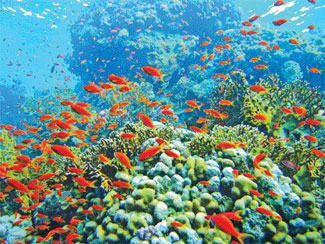 The Great Barrier Reef was one of Australia's first heritage area's.
It is in the world's biggest property, extending over 2000 km and
covering over 348,000 on the north east continental shelf of Australia.
Larger than Italy, it is one of the best known marine areas under
protection. The Great Barrier Reef was one of Australia's first heritage area's.
It is in the world's biggest property, extending over 2000 km and
covering over 348,000 on the north east continental shelf of Australia.
Larger than Italy, it is one of the best known marine areas under
protection.
The Great Barrier Reef's diversity reflects the maturity of the
ecosystem which has evolved over many thousands of years. It is the
world's most extensive coral reef system and has some of the richest
biological diversity found anywhere. The Great Barrier Reef contains
extensive area's of seagrass, mangrove, sandy and muddy seabed
communities, inter-reefal areas, deep oceanic waters and island
communities. Contrary to popular belief, the Great Barrier Reef is not a
countinous but a broken maze of around 2,900 individual reefs, of which
760 are fringing reefs along the main land or around islands. The reef
ranges in size, from less than one hectare to over 1000 km and also in
shape; from flat platform reefs to elongated ribbon reefs.
The Great Barrier Reef is one of the seven wonders of the natural
world, and when viewing it from a greater distance, you can understand
why. The Great Barrier Reef is blessed with breathtaking beauty.
A close encounter with this impressive coral garden reveals many
astounding, underwater attractions including the world's largest
collection of corals, coral sponges, molluscs, rays, dolphins, over 1506
species of tropical fish, around 20 types of reptiles including sea
turtles and giant clams over 120 years old.
Pubuduni Karalliyadde,
Year 4,
Epping Heights Public School,
Sydney, Australia.
|

